Middle East and North Africa
Rating Overview
In 2024, the MENA region was home to escalating rights violations, intensifying with Israel’s relentless military campaign, which since October 2023 has driven Gaza into a humanitarian and human rights catastrophe. This has come with an escalation of Israel’s violations of Palestinian civic freedoms, leading to a drastic deterioration of the OPT’s already restricted civic space situation (see countries of concern below).
Israel continues to cause catastrophe in the region. In Lebanon, escalating Israeli attacks have killed more than 2,700 people, injured 13,000 and displaced at least 1.3 million since 8 October 2023. Repeated attacks on aid workers by the Israeli military in southwest Lebanon have resulted in injuries to UN aid workers and the destruction of their equipment from deliberate targeting. Israeli airstrikes on the main border crossing between Lebanon and Syria have disrupted critical humanitarian operations and hindered civilians attempting to escape. Meanwhile, in Israel and Jordan, authorities have instrumentalised laws to target and prosecute people expressing solidarity with Palestinians through anti-war protests and social media.
As with previous years in the MENA region, governments have continued to persecute those perceived to be their political opponents. In Tunisia, over 100 prospective candidates, members of their campaigns and other political figures were arrested on a variety of charges, ranging from falsification of electoral paperwork to national security charges, ahead of the October 2024 presidential election. Similarly in Egypt, authorities continued to imprison people for political reasons after a wave of unlawful arrests of potential candidates and their supporters that began ahead of the December 2023 election with the aim of preventing any meaningful competition. In February 2024, prominent Egyptian politician Ahmed Tantawy and his supporters were sentenced to a year in prison for alleged offences associated with his challenge to President Abdel Fattah el-Sisi.
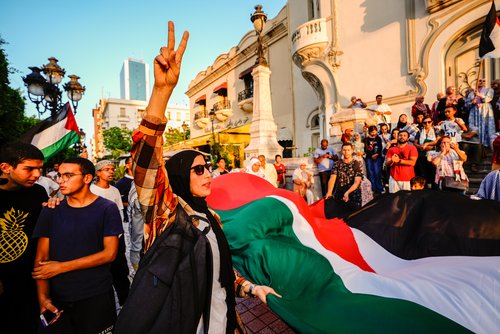
In the United Arab Emirates (UAE), over 60 activists belonging to the UAE84 group of democracy advocates, who were being held in prison past the end of their sentences, were among at least 84 HRDs and political dissidents who were subjected to an unfair mass trial in December 2023 on charges of establishing a ‘terrorist organisation’ and supporting and funding this organisation.
Transnational repression was also documented in several countries as authorities went beyond borders to target activists and HRDs in exile. Qatari authorities refused to renew Germany-based HRD Abdullah Al-Malik’s official documents, in the latest of their continued efforts to force him to return to face imprisonment. The government of Kuwait continued to target exiled blogger Salman Al-Khalidi, arbitrarily revoking his citizenship in April 2024.
In Saudi Arabia, detained and imprisoned activists continue to be mistreated behind bars, with reports of enforced disappearance, medical neglect and sexual harassment, among other violations. HRD Issa Al-Nukhaifi undertook several hunger strikes in protest against his prolonged arbitrary detention and mistreatment. Detained HRD Mohammed Fahad Al-Qahtani also remains forcibly disappeared since October 2022, when he was held as part of a new investigation just a month before completing his initial 10-year prison sentence.
Across the region, the status of women HRDs and women’s rights activists remains a particular concern as they continue to face blatant attacks, including murder and cycles of judicial harassment that repeatedly return them to and keep them in prison. In Syria, women’s rights activist Heba Suhaib Haj Arif was found murdered in her home in February 2024 shortly after receiving threats to try to make her resign from working in a school affiliated with the Yeni Adam organisation, meaning ‘new step’ in Arabic. In Iran, woman HRD Narges Mohammadi remains in prison along with other women HRDs. While already serving an eight-year sentence, Narges was handed an additional year in jail in June 2024 because of her human rights work while behind bars. Movement restrictions imposed by authorities have affected women across all parts of Yemeni society, including women working with CSOs who face targeting by checkpoint officials.
As a result, civic space continues to decline in the region. The OPT’s rating has been downgraded from repressed to closed amid Israel’s brutal military assault, which has resulted in a sharp decline in civic freedoms. While Israel remains in the obstructed category, its civic space is regressing due to a heightened crackdown on anti-war protests and Palestinian solidarity actions throughout the year.
Ongoing crisis: journalists killed
Israel’s bombardment of Gaza has taken an unprecedented toll on journalists. The number of journalists killed to date is the highest ever recorded in any conflict in modern history, according to the UN. As of 7 November 2024, at least 183 Palestinian journalists had been killed in Gaza.
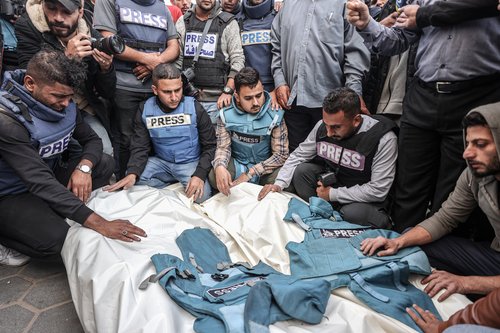
Killings of journalists are not random or isolated events. Since 7 October 2023, Israel has practised a systematic policy of targeting journalists in the OPT with direct attacks and excessive force. Many journalists have reported attacks that have put their lives at risk while doing their work, including the use of live ammunition, rubber bullets and tear gas assaults. The targeting of journalists must be seen within the context of Israel’s wider campaign to dominate the media landscape in Israel and the OPT, with the closure of Al Jazeera outlets in both countries offering an example.
Israel has also deliberately targeted and killed journalists in Lebanon since October 2023, with local CSOs reporting that 12 journalists have been killed since October 2023 and many more have been injured and displaced. On 25 October 2024, three journalists were killed in an Israeli airstrike on a building in Hasbaya, southeast Lebanon, where more than a dozen journalists from at least seven media organisations were sleeping. News photos showed a bombed courtyard containing cars clearly marked with the word ‘press’, leading Lebanon’s information minister to call the attack deliberate. In September 2024, two more journalists were killed in separate Israeli airstrikes on south Lebanon.
Top violations
In MENA, the most common violations of civic freedoms documented in the past year were the prosecution of HRDs, detention of journalists, censorship, detention of HRDs and the prosecution of journalists.
Human rights defenders prosecuted
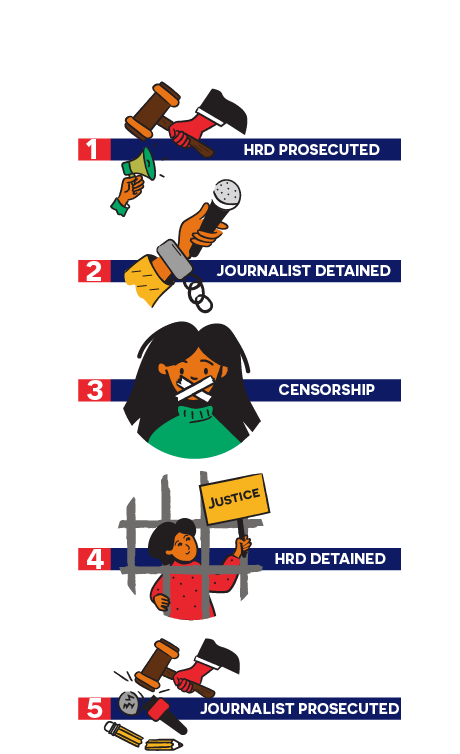
HRDs working on a diverse range of issues were prosecuted in at least eight countries in MENA in the past year. In Jordan, authorities have targeted activists who expressed solidarity with Palestinians, including activist Anas al-Jamal, was charged and convicted for his posts about the OPT on X/Twitter. While he was released in January 2024 after payment of bail through crowdfunding, he faces a travel ban. Palestinian-Jordanian Journalist Hiba Abu Taha was also charged and sentenced after publishing an article criticising Jordan’s interception of Iranian missiles fired towards Israel in April 2024.
Activists have also faced charges for criticising government policies and officials, as seen in Egypt, where a third lawsuit was filed against poet Galal El Behairy for writing a song criticising President el-Sisi’s policies. In Oman, online activist Mohammed Ali Bakhit, also known as Abu Ali Al-Barami, was charged in March 2024 for ‘distorting the government’s image and directing insulting criticism at its ministers’, in relation to posting tweets. He was later acquitted.
People who advocate for the rights of minority groups are also targeted, as seen in January 2024, when Kuwait’s Court of Appeal sentenced Mohammed Al-Barghash, a prominent defender of the rights of the stateless Bedoon community, to three years in prison with hard labour on fabricated charges of spreading fake news and harming the state’s reputation, after overturning his initial acquittal.
Across the region, those who advocate for the rights of women continue to face severe punishment through judicial harassment and instrumentalisation of the justice system. In Saudi Arabia, woman HRD Manahel Al-Otaibi was sentenced to 11 years in prison, while in Yemen, Fatima Saleh Al-Arwali was given a discretionary death sentence, both in retaliation for their work on women’s rights. Al-Otaibi has been subjected to sexual harassment and various forms of abuse while in detention.
Journalists detained
The detention of journalists was the second most common violation in MENA, documented in at least six countries. Authorities particularly targeted journalists covering Palestinian solidarity protests, and those reporting on politics and public affairs.
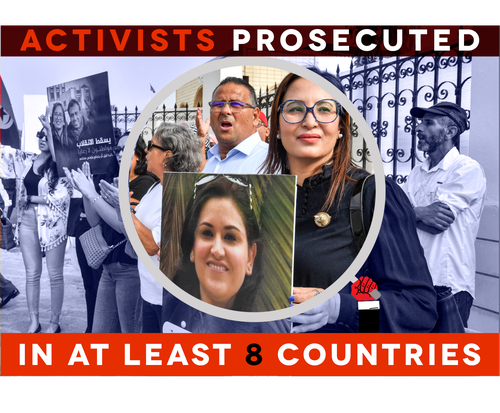
As part of Jordan’s ruthless crackdown on large-scale Palestinian solidarity protests, authorities have arbitrarily detained reporters for covering protests. Authorities detained journalists Khair Al-Jabri, Ahmad Mohsen and Abdul Jabbar Zeitoun in March 2024 as they covered protests.
In Egypt, Ashraf Omar, cartoonist for the Al-Manassa independent news outlet, was arrested and detained in July 2024 after publishing cartoons joking about power outages. Earlier that week, journalist Khalid Mamdouh disappeared for several days and was unjustly detained before appearing before the Supreme State Security Prosecution on accusations of joining a terrorist group and broadcasting ‘fake news’.
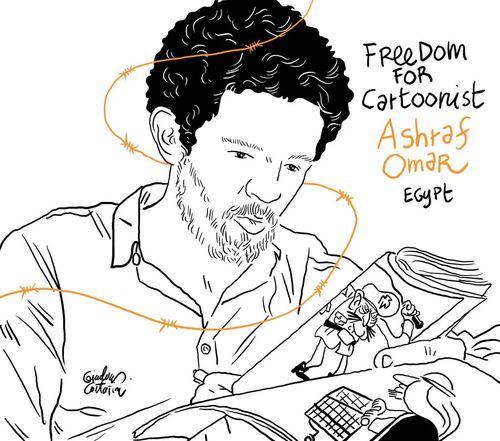
In a similar vein, in July 2024 security forces in Libya arrested Ahmed al-Sannusi, a regular government critic and host of the Flosna TV show. The show covers local politics and economics on the independent Wasat TV channel. In Tunisia, police arrested two journalists, Borhen Bssais and Mourad Zghidi,in May 2024 in connection with Bssais’ television and radio commentary critical of President Saied and Zghidi’s social media posts in solidarity with imprisoned journalist Mohamed Boughaleb.
In Iraq, police officers arrested journalists Kamel Al-Kaabi and Duraid Al-Khafaji of Iraq Fox News Agency after they accused them of disobeying orders while filming in the capital, Baghdad. They released them after eight hours. In Yemen, security forces affiliated with the secessionist Southern Transitional Council arbitrarily arrested and detained photojournalist Saleh Al-Obaidi in June 2024, releasing him the following day after a widespread online solidarity campaign by press institutions and citizens.
Censorship
Censorship was the third most common violation in MENA, documented in at least nine countries. Authorities are using draconian laws to harass, intimidate and prosecute people for expressing their opinions. In the context of Israel’s bombardment of the OPT, media outlets and social media users in Israel, Jordan and the OPT are being particularly targeted with various forms of censorship of their coverage or criticism of Israel’s military actions.
In Israel in May 2024, the government used the newly passed draconian Law for the Prevention of Foreign Broadcasting Harm to State Security (Temporary Order – Iron Swords), 5774-2024 to order the cessation of Al Jazeera broadcasts in Arabic and English in Israel, ban its website in Israel, close its offices and confiscate its equipment, after accusing the outlet of being a ‘Hamas mouthpiece’. In the OPT, Israel continued its campaign of restricting journalists, media outlets and mass media coverage, including through the closure of Al Jazeera’s OPT office and the J-Media Agency through military orders.
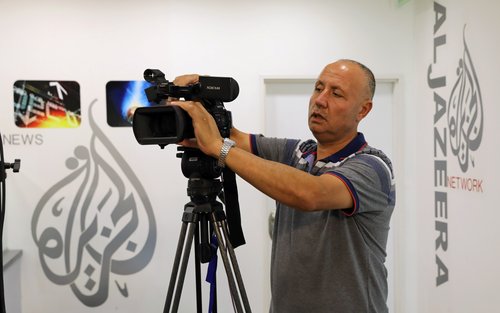
In Jordan, authorities arrested online activists supporting Palestinian solidarity protests, threatened them with lengthy prison sentences and hefty fines under the Cybercrimes Law and told them to sign pledges to no longer share protest-related content on social media in exchange for their release.
In Libya, activists were abducted for expressing their opinions on social media, as seen with the abduction of activist Abdelaziz Jamal Boukmar by security agents over a Facebook post criticising a government official’s corruption. The Libyan Ministry of Interior has acknowledged the existence of a cybersecurity team within the ministry, tasked with monitoring online activities, with people facing imprisonment without any judicial proceedings.
In Iran in early 2024, rapper Toomaj Salehi received a death sentence and fellow musician Shervin Hajipour was sentenced to three years in prison for writing songs in support of women’s rights in the wake of the 2022 mass protests sparked by the death of Mahsa Amini.

Israel and the Occupied Palestinian Territories
Israel's ongoing bombardment of Gaza has had a significant impact on civil liberties in Israel and the OPT. In Israel, the government has misused the state of emergency declared following the 7 October 2023 attacks to enact emergency regulations that fail to meet necessity and proportionality tests and that risk eroding the separation of powers. The Israeli government has passed at least 19 emergency regulations that restrict several freedoms, including an emergency regulation which gives the Minister of Defence the power to shut down foreign broadcasters deemed to ‘harm the security of the state’. Proposed amendments to the Counter-Terrorism Law could also disproportionately harm freedom of expression by removing the probability test as required by international law.
Police have repeatedly stopped journalists covering protests, including by using physical violence and false arrests, and have also failed to protect journalists when they have been attacked.
Palestinian citizens of Israel and some Jewish Israelis have faced political persecution and attacks on their freedoms of assembly and expression for voicing their support for or showing solidarity with people in Gaza. By 1 May 2024, over 160 indictments had beenfiled concerning charges of incitement to terrorism, almost exclusively against Palestinian citizens of Israel and Palestinian residents of East Jerusalem.
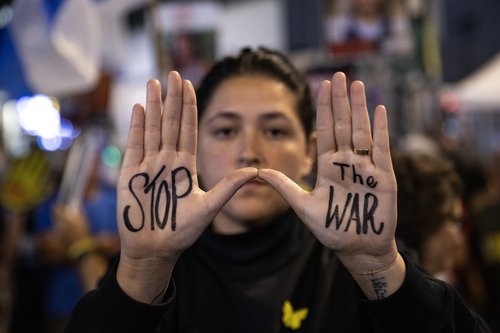
As people continued to mobilise anti-war protests in Israel throughout the year, widespread restrictions on the right to protest were documented, including the disproportionate use of force, arbitrary arrests, unnecessary authorisation requirements, the banning of previously approved protests and confiscation of protest signs. Civil society noted that there was evidently a systematic police practice of violent arrests, attacks on protesters, sabotaging of protest signs and prevention of people carrying signs and chanting slogans. Civil society highlighted a recurring pattern of police abuse, with protesters frequently held in overnight detention without proper justification. For example, between 31 August and 9 September 2024, police arrested at least 127 protesters during anti-war protests. They held 56 of these in overnight detention, only for courts to find no substantial grounds for their arrest in remand hearings.
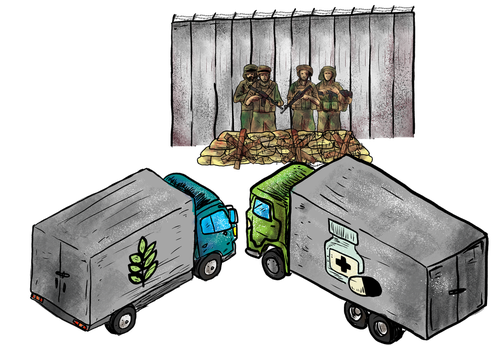
Palestinian students in Israeli universities have also faced targeting and retaliation for expressing Palestinian solidarity online, with several cases of universities instituting disciplinary proceedings, suspensions and expulsions of Palestinian students for their posts on social media about the bombardment of Gaza.
The OPT has been downgraded to a closed civic space rating and added to the CIVICUS Monitor Watchlist due to Israel’s intensified crackdown on civic space amid its military operations and the resulting humanitarian catastrophe. Israel’s bombardment has caused the highest number of deaths of journalists and aid workers reported in any conflict in modern history.
Alongside its violent targeting of journalists, Israel is frustrating the operations of humanitarian organisations by blocking aid, jeopardising the existence and funding of much-needed Palestinian CSOs and UNRWA with its unsubstantiated terrorism allegations, destroying CSO buildings and infrastructure through deliberate targeting and undermining access to life-saving information through regular internet and communications shutdowns.
| COUNTRY | SCORES 2024 | 2024 | 2023 | 2022 | 2021 | 2020 | 2019 | 2018 |
| ALGERIA | 31 | |||||||
| BAHRAIN | 18 | |||||||
| EGYPT | 20 | |||||||
| IRAN | 8 | |||||||
| IRAQ | 18 | |||||||
| ISRAEL | 47 | |||||||
| JORDAN | 39 | |||||||
| KUWAIT | 27 | |||||||
| LEBANON | 44 | |||||||
| LIBYA | 28 | |||||||
| MOROCCO | 43 | |||||||
| OMAN | 23 | |||||||
| PALESTINE | 13 | |||||||
| QATAR | 29 | |||||||
| SAUDI ARABIA | 4 | |||||||
| SYRIA | 6 | |||||||
| TUNISIA | 37 | |||||||
| UNITED ARAB EMIRATES | 11 |
